Extend Sidewalk Life-span: Cutting-edge Cold Mix Asphalt Sealing
Extend Sidewalk Life-span: Cutting-edge Cold Mix Asphalt Sealing
Blog Article
Cold Mix Asphalt Vs. Hot Mix Asphalt: Which Is Right for You?

Make-up Differences
Cold mix and warm mix asphalts differ significantly in their make-up, with distinct attributes that influence their performance and applications. Cold mix asphalt is created by emulsifying the asphalt binder with water and an emulsifying representative before mixing it with accumulation. This method permits for the asphalt to be practical at reduced temperatures, making it suitable for temporary repair services and for use in colder climate condition. Warm mix asphalt, on the various other hand, is manufactured at high temperature levels, generally between 300-350 ° F, which assists to accomplish far better compaction and a much more durable end product. The warm mix asphalt manufacturing process includes heating up the aggregate and asphalt binder independently before combining them at the asphalt plant.
Moreover, cool mix asphalt often tends to be much less thick and more versatile than warm mix asphalt. This versatility makes it much better fit for areas with higher degrees of activity, such as driveways or roadways with rush hour. On the other hand, hot mix asphalt is known for its high toughness and resistance to rutting and breaking, making it a favored option for highways and high-traffic roadways where durability is essential.
Setup Process Differences
The procedure of setting up cool mix and hot mix asphalt displays remarkable variances in their demands and treatments. In comparison, hot mix asphalt requires an extra elaborate setup process. Due to the home heating requirements, hot mix asphalt setups are typically carried out by experts with specialized tools, ensuring a much more structurally audio and irreversible result.
Toughness and Long Life Factors
When taking into consideration asphalt choices, toughness and durability are essential factors to assess for lasting sidewalk performance. Warm mix asphalt (HMA) is recognized for its exceptional durability and long life.
In terms of long life, HMA normally outshines CMA due to its remarkable toughness and resistance homes. HMA pavements have a longer solution life, requiring much less frequent repairs and upkeep, which can translate to cost financial savings over time. In addition, HMA pavements are extra quickly personalized to fulfill particular task demands, better enhancing their resilience.
Cost Considerations
Taking into consideration the financial effects is a critical aspect when examining browse this site the selection between warm mix asphalt (HMA) and chilly mix asphalt (CMA) for sidewalk jobs. While the first cost of hot mix asphalt is commonly higher than that of chilly mix asphalt, HMA usually provides an extra affordable option over time due to its premium toughness and longevity. HMA is known for its capability to stand up to heavy web traffic lots and harsh climate conditions, minimizing the demand for website link constant repairs and maintenance. On the various other hand, cool mix asphalt is more budget friendly upfront however may require more frequent patching and resurfacing, leading to higher upkeep expenses gradually.
In enhancement to material costs, it's vital to take into consideration the costs connected with installation and maintenance when comparing HMA and CMA. HMA generally calls for customized devices and competent labor for correct setup, which can impact total job expenses. On the other hand, CMA is easier to deal with and can commonly be applied utilizing less complex methods, possibly reducing installment expenses. Inevitably, the decision between HMA and CMA need to consider not just the initial expense but likewise the long-lasting economic ramifications to determine one of the most economical option for the certain pavement job.
Environmental Influence Comparison
Comparison of the ecological impacts in between warm mix asphalt (HMA) and cold mix asphalt (CMA) exposes unique distinctions in sustainability methods. HMA manufacturing calls for heats, resulting in raised energy usage and greenhouse gas exhausts. The procedure also launches volatile organic compounds (VOCs) and dangerous air contaminants (HAPs) right into the atmosphere. In contrast, CMA is created and used at reduced temperature levels, decreasing power use and exhausts dramatically. The lower production temperatures of CMA result you can try these out in decreased gas consumption and lower levels of CO2 emissions, making it a much more eco-friendly alternative.
Additionally, the use of CMA usually involves recycling existing asphalt sidewalk, promoting source conservation and lowering the quantity of waste sent to land fills. By choosing for CMA over HMA, roadway construction projects can contribute favorably to environmental preservation initiatives.
Verdict
In conclusion, the option in between chilly mix asphalt (CMA) and hot mix asphalt (HMA) relies on various aspects such as make-up, setup procedure, resilience, durability, price, and ecological effect. asphalt repair. While CMA offers a cost-efficient and quick service for small fixings, HMA ensures superior toughness and longevity for heavy traffic areas. Take into consideration these aspects meticulously to determine which kind of asphalt is the best option for your paving needs
.png)
Considering the monetary effects is a vital aspect when assessing the selection between warm mix asphalt (HMA) and chilly mix asphalt (CMA) for sidewalk projects. While the preliminary price of warm mix asphalt is generally greater than that of cold mix asphalt, HMA typically gives a more affordable service in the lengthy run due to its premium sturdiness and durability. cold mix asphalt.Contrast of the environmental impacts between hot mix asphalt (HMA) and chilly mix asphalt (CMA) exposes unique distinctions in sustainability methods.In conclusion, the choice between cool mix asphalt (CMA) and hot mix asphalt (HMA) depends on different aspects such as make-up, installment procedure, sturdiness, durability, expense, and ecological impact
Report this page